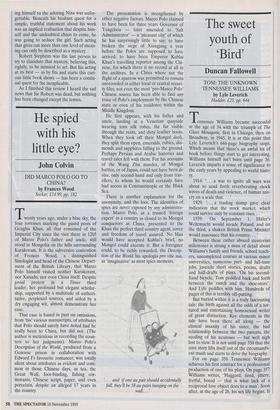He spied with his little eye?
John Colvin
DID MARCO POLO GO TO CHINA? by Frances Wood Secker, £14.99, pp. 182 Twenty years ago, under a blue sky, the four tortoises marking the guard posts of Genghis Khan, all that remained of the Imperial City since the visit there in 1265 of Marco Polo's father and uncle, still stood in Mongolia on the hills surrounding Karakoram. It is the subversive contention of Frances Wood, a distinguished Sinologist and head of the Chinese Depart- ment of the British Library, that Marco Polo himself visited neither Karakoram, nor Xanadu, nor even China itself. Despite jovial protest in a Times third leader, her profound but elegant scholar- ship, supported by a multitude of authori- tative, perplexed sources, and aided by a dry engaging wit, almost demonstrate her case.
That case is based in part on omissions, from 'his' various manuscripts, of attributes that Polo should surely have noted had he really been to China, but did not. (The author is meticulous in recording the coun- ters to her judgments). Marco Polo's Description of the World, produced from a Genoese prison in collaboration with Edward I's favourite romancer, was totally silent about attributes as evident and com- mon in those Chinese days, as tea, the Great Wall, foot-binding, fishing cor- morants, Chinese script, paper, and even porcelain, despite an alleged 17 years in the country. The presentation is strengthened by other negative factors. Marco Polo claimed to have been for three years Governor of Yangzhou — later amended to 'Salt Administrator' — a 'pleasant city' of which he has surprisingly little to say; to have broken the siege of Xiangjang a year before the Polos are supposed to have arrived; to have been Emperor Kublai Khan's travelling reporter among the Chi- nese, for which there is no record at all in the archives. In a China where not the flight of a sparrow was permitted to remain unrecorded in either local or central securi- ty files, not even the most 'pro-Marco Polo' Chinese source has been able to find any trace of Polo's employment by the Chinese state or even of his residence within the Middle Kingdom.
He first appears, with his father and uncle, landing at a Venetian quayside wearing torn silk robes, the fur visible through the rents, and dirty leather boots. When they took off their Mongol deels, they split them open, emeralds, rubies, dia- monds and sapphires falling to the ground. Perhaps Persian and Arabic histories and travel tales fell with them. For his accounts of the Wang Zhu murder, of Mongol battles, or of Japan, could not have been de visu, only second-hand and only from trav- ellers, to whom he would certainly have had access in Constantinople or the Black Sea.
There is another explanation for the anonymity, and the loot. The identities of spies are never exposed by any administra- tion. Marco Polo, as a trusted 'foreign expert' in a country as closed to its Mongol conquerors as China, presented to the Khan the perfect third country agent, cover and freedom of travel assured. No Han would have accepted Kublai's brief, no Mongol could execute it. But a foreigner could, to be richly rewarded, the Descrip- tion of the World his apologia pro vita sua, as 'imaginative' as most spies memoirs.
. . and if one au pair should accidentally fall, they'll be 58 au pairs hanging on the wall...'


















































































 Previous page
Previous page